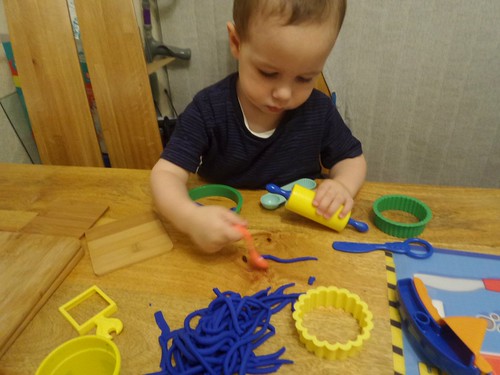So, over the last few months there's been a bit of a dip in my health, and work isn't getting any easier. Okay, so work isn't meant to be easy - if it was, they wouldn't have to pay people to do it. But this isn't "work knackers me out so much I can't go clubbing," this is more "work knackers me out so much that half the time it's hit-and-miss whether I can manage to have a shower, even with assistance," and that's really taking things too far. Of my daily
"spoons", I'm prepared to hand
most of them over for work, but I do need a few left for attending to my essential personal care needs, my bits and bobs of housework, my relationship with Steve, my friends and family, and - dare I suggest it? - a little bit of leisure activity beyond lying in bed sporadically knitting or poking at a laptop computer in between waves of pain. And I really should keep a couple of spoons in reserve for emergencies (like unconscious boyfriends, or mornings at the CAB).
For the last few months, I've been spending spoons I don't have, and reclaiming them by using my annual leave for days off work to recover. That's not sustainable. For starters, I don't have
that many days of annual leave, and besides, that's not what annual leave is for. My boss, who is very nice, encourages me to take time off sick if I need it and I have taken some sick days, but I don't want to screw over him, the company, or my own sickness record, by taking a paid sick-day every week. But by pushing my limits like this, I am damaging my health in the long and short term. This cannot continue.
Solution: reduce my regular paid hours, for reasons of ill-health - work four short days a week rather than five. My boss is amenable to the idea; however, now there is a new issue. Since I am on a very low hourly rate, dropping this many hours will mean I no longer earn enough to be paying National Insurance.
National Insurance is very important. If you haven't paid enough National Insurance contributions ("the stamp"), you can't get benefits such as Incapacity Benefit or a state pension. When you have a long-term health condition, it's important to keep this safety net in place. If you are unable to work and claiming Incapacity Benefit, your stamp is paid. If I asked my doctor to sign me off as sick, and I stopped work altogether, I would automatically go back onto the rate of Incapacity Benefit which I was on before I started work. My stamp would then be paid and I would be financially "safe".
But I don't want to stop work altogether, and my doctor agrees that I don't need to stop work altogether. I just can't safely continue working this many hours without damaging my health. I fall into a kind of No-Man's-Land. I looked into voluntary National Insurance contributions, but at £8.10 a week that's out of the question - my earnings would be reduced to below-benefits-level because of working less hours, deducting another £8.10 a week on top of that just makes the whole thing silly. Who should I call to help figure this out? Roll call!
My boss continually assured me that as soon as I knew what I needed from them by way of adjustments, he would get it sorted out for me.
My doctor said she didn't know what the rules were - her specialist field is medicine, not employment, tax or welfare - but she assured me that she would support me with whatever I needed and offered that if necessary she would write me a very specific sicknote detailing that while I needed to work reduced hours, it would be detrimental for me to stop work entirely.
The Incapacity Benefit helpline took a while to understand that I
didn't want to stop work completely and then told me they would get back to me with an answer (they never did). They also recommended I call the Disability Employment Adviser (DEA) at my local Jobcentre.
The local Jobcentre DEA, who we've met before, didn't even attempt to help me find a solution when she finally deigned to call me back, but gave me an earful about how "Incapacity Benefit is not a lifestyle choice just because you feel like working less." Happily this is the level of supportiveness and understanding that I have learned to expect from her, so after a few minutes I gave up on my efforts to explain that this wasn't about "choice" or about how many hours I "felt like doing", nor about an effort to "boost my income with benefits", and just let it go.
The local Jobcentre Incapacity advisor said much the same.
"You can work less hours and make voluntary NI contributions."
"But if I work less hours, I will have less money, and not be able to afford NI contributions."
"You can claim Tax Credits if you are poor."
"No, you can't claim Tax Credits if you work less than 16 hours a week."
"oh yes... well, your partner can claim Tax Credits on the basis that he has a low income and a dependent with a long-term health problem."
"My partner's a contractor, we'd have to fill in a new set of forms every week. Besides, it's not that we're poor as a household. It's that I want to pay my own way. I want independence, not to have to rely on him for handouts."
"Benefits isn't independence. Work is independence."
"But I'll be better off on Incapacity Benefit."
"I never said that..."
The CAB told me to contact the doctor, the IB helpline and the DEA at the local Jobcentre. When I said "done that" they were pretty much out of ideas and that I probably had no option but to give up work entirely. I told them I was waiting for a call back from Remploy. They said that was my best bet, then. Oh good.
The bloke from
Remploy suggested that if I got back onto Incapacity Benefit, then I would be allowed to do Permitted Work. People doing Permitted Work keep their IB, and can work up to 16 hours and keep up to £88 of their earnings each week. But except in special cases, this is only for six months (after which you either go to full-time, or stop work completely).
I asked if there was a route that was more 'sustaining employment' than 'starting employment'. He told me that New Deal for Disabled People (NDDP) is being phased out and replaced by something called Pathways to Work. Pathways to Work have been active in my local area for about a month via a private company called
Working Links. According to my Remploy chap, the staff at Working Links are fairly new to the game (obviously, since they've only been here for a month) and they took over a week to get an answer to him regarding my situation. The answer was that eligibility for help from Pathways to Work is dependent on having been on Incapacity Benefit for the previous 13 weeks. Which I haven't been. I've been working. So I can't have any help, unless I'm prepared to spend a quarter of a year being completely unemployed again and then
hope that I can get my job back.
That's not helpful.
The biggest help so far has come from my boss and the company accountant. We've worked out the minimum number of hours I need to work to retain my NI contributions and that is how many hours I will be working as of this week. We've had to tweak a bit, basically from now on I will only be going in four days a week (giving me Wednesdays to recuperate as well as Saturdays and Sundays), but working an extra half-hour on those days. We'll have to see how well it goes. It's still more hours than my doctor and I think I really should be doing but at this stage it's better than completely giving up work.
Here's my options.
Option one: work 17.5 hours a week. National Insurance contributions paid. Take-home pay of about £88 a week, after tax, NI, transport costs etc. Working more hours than my doctor thinks I should. Precious few 'spoons' left.
Option two: work 12 hours a week. Take-home pay of about £57 a week after voluntary NI and transport costs. About the right number of hours work for my current state of health, and enough spoons left over to attend to basic daily needs (eg mountain-climbing: no, grocery shopping: yes).
Edit: I have been informed in the comments that voluntary NI counts towards one's pension, but is not counted for an Incapacity Benefit claim.Option three: stop work and go back on IB. National Insurance contributions paid. Take-home pay of about £85 a week. All of my time and spoons to myself. However, no colleagues to chat to, no work goals to accomplish, no acceptable answer to the question "so, what do you do for a living?" and precious little self-respect.
What would you do?




